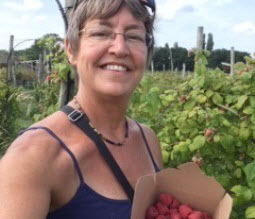Inquiring Students Want to Know…

So where does our cafeteria food come from?
 Lu Ann Carey’s father grew peaches for most of his life and, at 84, still operates a fruit truck offering fresh produce to his community. Lu Ann inherited his passion for agriculture and has for 15 years engaged students in sustainable gardening at Bradley Central High School (Cleveland, TN). After attending a Fund for Teachers information session last fall, she capitalized on the opportunity to design a fellowship researching sustainable growing practices in the Netherlands. Why? Because…
Lu Ann Carey’s father grew peaches for most of his life and, at 84, still operates a fruit truck offering fresh produce to his community. Lu Ann inherited his passion for agriculture and has for 15 years engaged students in sustainable gardening at Bradley Central High School (Cleveland, TN). After attending a Fund for Teachers information session last fall, she capitalized on the opportunity to design a fellowship researching sustainable growing practices in the Netherlands. Why? Because…
- The Netherlands is the second largest exporter of horticulture products in the world
- More than 90 percent of vegetable cultivation involves biological crop protection
- The horticulture sector involves employment and education of more than 400,000 people
- The Dutch government allocates 10 percent of the total agricultural research budget to organic farming
- Growers there focus on closed growing systems that keep pesticides out of water and utilize clean energy sources
For three weeks this summer, Lu Ann researched concepts and practices that made Holland one of the most innovative and successful horticulture production systems in the world. From a tulip museum exhibit on the earliest trials of plant genetics, to one of the oldest botanical gardens documenting the history of plants and genomic plant banks, Lu Ann sought out methodologies for creating healthy, clean and sustainable foods in Bradley Central High School’s greenhouse.
Read more about Lu Ann’s learning on the blog she maintained throughout her fellowship.
“Horticulture is a fascinating, beautiful and changing the world, but I have to make it enticing to high school students,” said Lu Ann. “In order to do so, I used an FFT grant to gain a better understanding of biotechnology and design greenhouse labs that incorporate today’s real world problems.”
Observing in a “glass city” how to switch from nonorganic to fully organic farming and touring one of the first biological companies that supplied bumble bees for greenhouse pollination are just two of the itinerary stops Lu Ann planned for harvesting ideas. She also met with a senior advisor at the Louis Bolk Institute to see how an organic school incorporates biodynamic farming into student labs and hands-on projects. At Bioverbeek, an organic grower which supplies products to the local and global market, she learned how to control pests in her school greenhouse; at Koppert Biologicals, a worldwide company researching healthy pesticides, Lu Ann connected with researchers and growers with whom her students will now Skype for future learning opportunities.
“After my visit to Koppert as well as other greenhouses such “Tomato World” and then the Warmonderhof school, I knew I had to integrate labs into my daily agriculture lessons,” said Lu Ann. “So I introduced research-based, scientific lab projects into all my Agriculture classes. Students are learning through research about biological systems and design a hands-on lab project to test a hypothesis.”
This fall, students investigated horticulture products used in the school’s cafeteria to see where they were produced. Interviews with the culinary chef underscored the importance of market availability and determine how organic products grown in their greenhouse can help support the school community. She also worked with students to learn insect life cycles and how predators of the insects invade the plant species and control the pest.
“We are researching insect behavior, learning to identify the predators and how the plant responds to pest invasions according to plant species and growing conditions,” said Lu Ann. “It’s what I learned in Holland by visiting various growers and organic farms.”
The responsibility of an educator, according to Lu Ann, is much larger than teaching facts. Instead, first-hand knowledge and a daily dialogue makes learning real – something she learned from her father a long time ago.
Lu Ann teaches Career and Technical Education Agriculture and is an FFA association advisor in leadership skills.
 Back to Blogs
Back to Blogs